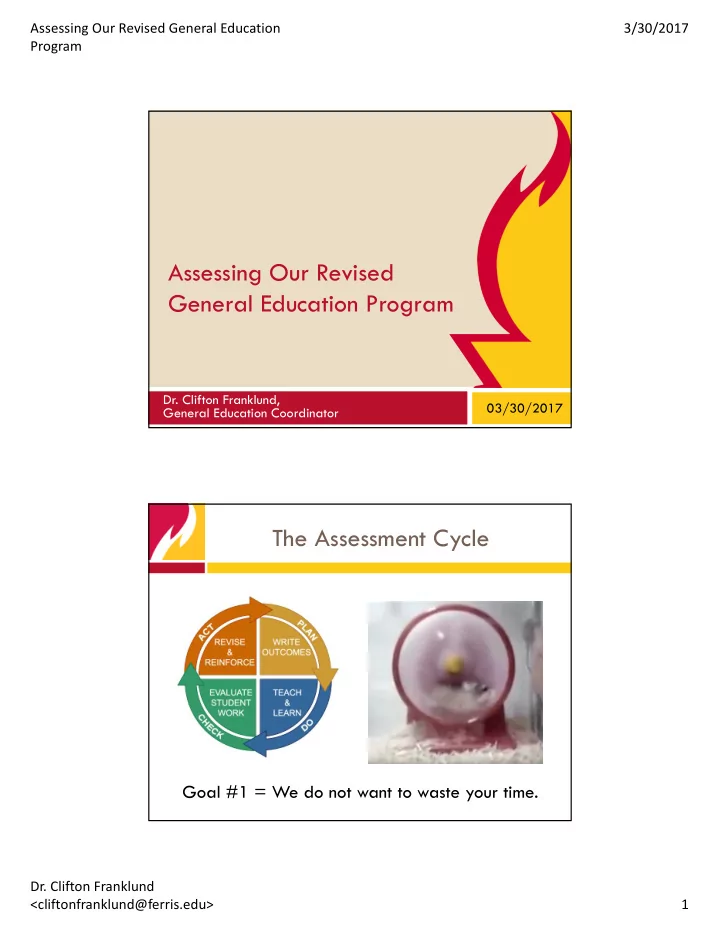

Assessing Our Revised General Education 3/30/2017 Program Assessing Our Revised General Education Program Dr. Clifton Franklund, 03/30/2017 General Education Coordinator The Assessment Cycle Goal #1 = We do not want to waste your time. Dr. Clifton Franklund <cliftonfranklund@ferris.edu> 1
Assessing Our Revised General Education 3/30/2017 Program What is Assessment Really About? Assessment is the systematic basis for making inferences about the learning and development of students. It is the process of defining, selecting, designing, collecting, analyzing, interpreting, and using information to increase students’ learning and development. Erwin 1991 Assessment is the systematic collection, review, and use of information about educational programs undertaken for the purpose of improving student learning and development. Palomba and Banta 1999 Assessment involves the use of empirical data on student learning to refine programs and improve student learning. Allen 2004 The Key to Sustainable Assessment Dr. Clifton Franklund <cliftonfranklund@ferris.edu> 2
Assessing Our Revised General Education 3/30/2017 Program Garbage In à Garbage Out Course-level data must be uniform and open to validation The Plan Gather course-level assessment data for all General Education classes Simplify, standardize, and automate documentation Use TracDat as a permanent and secure repository for all raw data De-identify, aggregate, analyze, and report findings publicly Evaluate, discuss, and use the data to improve the program Dr. Clifton Franklund <cliftonfranklund@ferris.edu> 3
Assessing Our Revised General Education 3/30/2017 Program Standardize Learning Outcomes CUL1: Interpretation – Students will be able to demonstrate an increased ability to interpret cultural works and practices, including but not limited to art, music, literature, language, history, philosophy and religion, as part of a broader culture and justify those interpretations with an understanding of the interpretive process. CUL2: Self-Awareness – Students will be able to articulate an understanding of themselves as part of culture(s) with rich historical perspectives and gain increased self-understanding through works of culture(s). CUL3: Analysis – Students will be able to develop justify and improve value distinctions (including aesthetic and ethical) in perception, craft and/or life choices. CUL4 Process-Awareness, Participation – Students will be able to explain the processes contexts and motivations behind the production of cultural works and practices, and when appropriate be able to participate in their creation. Standardized Measures Fourteen different types of assignments Exams Products Performances Pre-determined definitions Scoring Analysis Criteria of ”success” Dr. Clifton Franklund <cliftonfranklund@ferris.edu> 4
Assessing Our Revised General Education 3/30/2017 Program Standard Pedagogies Twelve defined pedagogies are defined Includes many “high-impact” practices Not meant to imply the superiority of any method Will track use over programs and time Standardized Data Collection 36 Excel workbooks are available 4 for each competency 4 for training purposes SCORE – for exams PREPOST – for pre-test/post-test NORM – for standardized exams RUBRIC – for products and performances Dr. Clifton Franklund <cliftonfranklund@ferris.edu> 5
Assessing Our Revised General Education 3/30/2017 Program TracDat Assignments Assignments for data reporting are emailed Copy and paste the workbook summary Complete a few other fields Attach the workbook and submit The entire process can be done in one cup of coffee Standardized Analysis All analyses and reports will be reproducible All datasets will be “FERPAnated” All de-identified datasets, analyses, and reports will be under version control and publicly available We will be using the Open Science Framework https://osf.io/bax9i/ Dr. Clifton Franklund <cliftonfranklund@ferris.edu> 6
Assessing Our Revised General Education 3/30/2017 Program Standardized Reporting General Education assessment reports will be formatted as journal articles Multiple Integrated Opportunities for Faculty Evaluation and Input Assessment IS when the faculty evaluate, critique, discuss, and act upon the reported data Reports will be made publicly for feedback Disqus is embedded in the HTML reports Comments are implemented in OSF Pull requests can be made using GitHub Dr. Clifton Franklund <cliftonfranklund@ferris.edu> 7
Assessing Our Revised General Education 3/30/2017 Program The End Result TracDat will be populated with a large number of standardized reports Meta-analysis of this dataset will be used to answer a variety of questions All faculty will have access to the data, analysis code, and reports A feedback cycle is built into data reporting to allow contextualization of results. Program Assessment This process could be adapted to other academic programs Workbooks would need to be modified One point person to send out assignments Advantage = easy and standardized Disadvantage = must agree to be standardized Dr. Clifton Franklund <cliftonfranklund@ferris.edu> 8
Assessing Our Revised General Education 3/30/2017 Program Accessing TracDat Now You should all have access If not – contact me and I’ll help get that sorted General Education Your program Questions or Comments? Dr. Clifton Franklund <cliftonfranklund@ferris.edu> 9
Recommend
More recommend